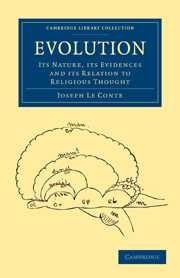Book contents
- Frontmatter
- PREFACE TO THE SECOND EDITION
- PREFACE TO THE FIRST EDITION
- Contents
- PART I WHAT IS EVOLUTION?
- PART II EVIDENCES OF THE TRUTH OF EVOLUTION
- PART III THE RELATION OF EVOLUTION TO RELIGIOUS THOUGHT
- CHAPTER I INTRODUCTORY
- CHAPTER II THE RELATION OF EVOLUTION TO MATERIALISM
- CHAPTER III THE RELATION OF GOD TO NATURE
- CHAPTER IV THE RELATION OF MAN TO NATURE
- CHAPTER V THE RELATION OF GOD TO MAN
- CHAPTER VI THE OBJECTION THAT THE ABOVE VIEW IMPLIES PANTHEISM, ANSWERED
- CHAPTER VII SOME LOGICAL CONSEQUENCES OF THE DOCTRINE OF THE DIVINE IMMANENCY
- CHAPTER VIII RELATION OF EVOLUTION TO THE IDEA OF THE CHRIST
- CHAPTER IX THE RELATION OF EVOLUTION TO THE PROBLEM OF EVIL
- Index
CHAPTER I - INTRODUCTORY
Published online by Cambridge University Press: 29 August 2010
- Frontmatter
- PREFACE TO THE SECOND EDITION
- PREFACE TO THE FIRST EDITION
- Contents
- PART I WHAT IS EVOLUTION?
- PART II EVIDENCES OF THE TRUTH OF EVOLUTION
- PART III THE RELATION OF EVOLUTION TO RELIGIOUS THOUGHT
- CHAPTER I INTRODUCTORY
- CHAPTER II THE RELATION OF EVOLUTION TO MATERIALISM
- CHAPTER III THE RELATION OF GOD TO NATURE
- CHAPTER IV THE RELATION OF MAN TO NATURE
- CHAPTER V THE RELATION OF GOD TO MAN
- CHAPTER VI THE OBJECTION THAT THE ABOVE VIEW IMPLIES PANTHEISM, ANSWERED
- CHAPTER VII SOME LOGICAL CONSEQUENCES OF THE DOCTRINE OF THE DIVINE IMMANENCY
- CHAPTER VIII RELATION OF EVOLUTION TO THE IDEA OF THE CHRIST
- CHAPTER IX THE RELATION OF EVOLUTION TO THE PROBLEM OF EVIL
- Index
Summary
From what has preceded, the reader will perceive that we regard the law of evolution as thoroughly established. In its most general sense, i.e., as a law of continuity, it is a necessary condition of rational thought. In this sense it is naught else than the universal law of necessary causation applied to forms instead of phenomena. It is not only as certain as—it is far more certain than—the law of gravitation, for it is not a contingent, but a necessary truth like the axioms of geometry. It is only necessary to conceive it clearly, to accept it unhesitatingly. The consensus of scientific and philosophical opinion is already well-nigh, if not wholly, complete. If there are still lingering cases of dissent among thinking men, it is only because such do not yet conceive it clearly—they confound it with some special form of explanation of evolution which they, perhaps justly, think not yet fully established. We have sometimes in the preceding pages used the words evolutionist or derivationist; they ought not to be used any longer. The day is past when evolution might be regarded as a school of thought. We might as well talk of gravitationist as of evolutionist.
If, then, evolution as a law be certain, if, moreover, it is a law affecting not only one part of Nature—the organic kingdom—and one department of science—biology—but the whole realm of Nature and every department of science, yea, every department of thought, changing our whole view of Nature and modifying our whole philosophy, the question presses upon us, “What will be its effect on religious belief, and therefore on moral conduct?”
- Type
- Chapter
- Information
- EvolutionIts Nature, its Evidences and its Relation to Religious Thought, pp. 275 - 283Publisher: Cambridge University PressPrint publication year: 2009First published in: 1898

